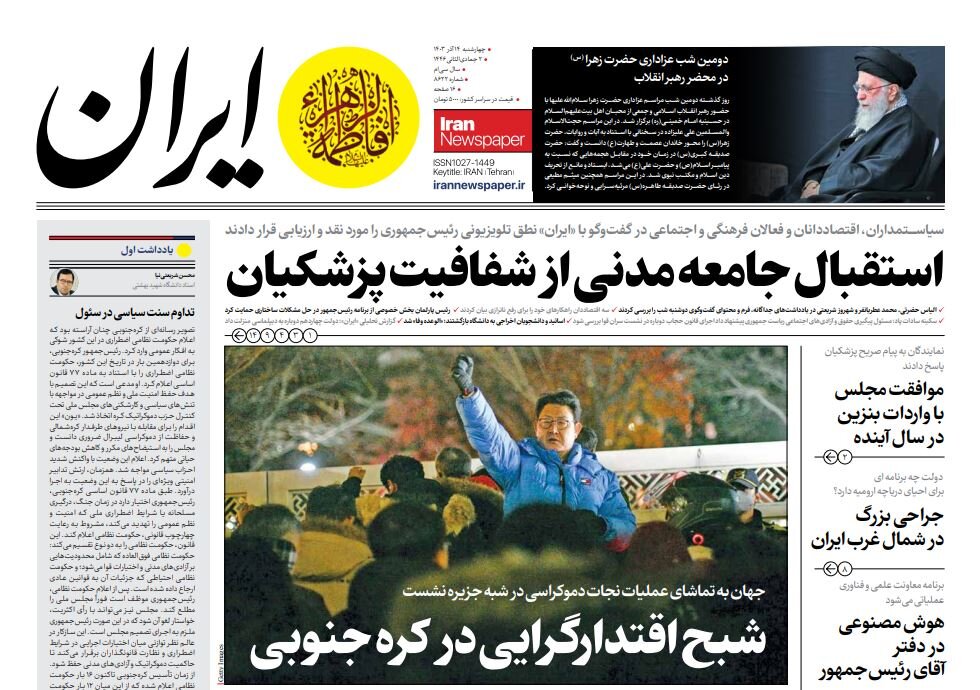Mandate to lift sanctions and build bridges
Mandate to lift sanctions and build bridges
TEHRAN - In a note, the Iran newspaper discussed the approach of Iran's foreign policy in the government of Pezeshkian and the path of reconciliation with the outside world.

It wrote: The goal of Pezeshkian is to reduce tension and establish a constructive relationship with the world based on the fundamental principles of "dignity, wisdom and expediency" and accordingly he has taken significant steps to clarify his foreign policy agenda. It was especially reflected in his visit to New York (where he attended the annual UN conference) that set the stage for the resumption of dialogue in Geneva (with the European trio). His administration’s important mission is to lift sanctions and resolve the nuclear dispute. Pezeshkian has put more energy into strategic diplomacy. He has mandated his diplomats to conduct negotiations to lift sanctions and end hostilities with some countries. The ups and downs in Iran's negotiation process with the West in recent years are quite obvious, and setting the negotiation path with the West is complicated due to the Ukraine war and the Gaza war.
Ham Mihan: Importance of strong diplomacy in advancing goals
In an analysis, Ham Mihan discussed the visit of Foreign Minister Araghchi to Damascus after the terrorist attacks of Hayat Tahrir al-Sham (HTS) in northwest Syria. It said: At this point, one of the most important aims of the new attacks by the Takfiri terrorists is to undermine the Arab world's wave of goodwill towards Iran and the resistance front after the October 7 operation. While some news sources were claiming a coup in Damascus and Bashar al-Assad's escape from Syria, Araghchi traveled to Damascus. The reflection and function of his visit were perhaps more effective than the dispatch of several military divisions. First, it was the message of Iran's decisive support for the Syrian central government, and second, it neutralized the massive media propaganda and confusing atmosphere. Thirdly, he showed Iran on the side of the Syrian people. Maybe official diplomacy is a solution to the problems but the role of these innovative actions in the form of public and media diplomacy should not be ignored. It shows that Araghchi is a master in his profession and uses all possible capacities to advance national interests.
Donya-e-Eqtesad: Iran's active diplomacy after developments in Syria
In an interview with Hossein Ajorlou, a Russia affairs expert, Donya-e-Eqtesad discussed the effectiveness of Iran's diplomacy regarding the developments in Syria. He said: Anything without diplomacy is generally challenged. Considering that the Islamic Republic of Iran is part of the Axis of Resistance and pursues specific interests and goals, it has tried to have a diplomatic base alongside actions on the battlefield. One of the ways for Iran to help Syria is to align conflicting interests. This issue also requires active diplomacy. Since last week, when the crisis unfolded, the Islamic Republic has adopted active diplomacy and is trying to manage this process diplomatically before the Syrian crisis enters a dangerous stage and leads to regional and international confrontations. On the other hand, if the countries of Iran, Russia, and Turkey, plus the Syrian government, can make something happen in the Astana meeting in Doha, it might lead to the control of developments.
Jam-e-Jam: Supporters of hired terrorists and limited opportunity of the Astana format
Jam-e-Jam wrote in a commentary: Almost immediately after the official declaration of the ceasefire between the Lebanese government and the Zionist regime, suddenly news broke out in regional and American-Zionist media outlets about the attack of Idlib-based hired terrorists towards the city of Aleppo. These terrorist attacks showed that the Syrian government, as an important and effective pillar of the resistance front, is facing a front of forces trained by a group of its enemies, especially the United States, the usurper regime of Israel, and Turkey. In the meantime, Araghchi's timely trip to Damascus and then Ankara indicated that Tehran has carefully noticed the American-Zionist scenario against the resistance front and is not going to be passive or retreat. It can be said that Araghchi's trip to Ankara was more about explaining Iran's clear and unchanging position regarding the resistance front and trying to resolve the issues surrounding the hired terrorists in Syria by reminding Turkey of its commitments as outlined in the Sochi Agreement. With these interpretations, we have to wait and see whether the enemies of the resistance front and the supporters of hired terrorists will take advantage of the opportunity to resolve the issue diplomatically or they will insist on repeating the bloody events of the past decade.
source: tehrantimes.com